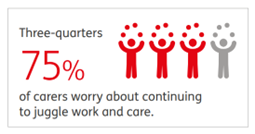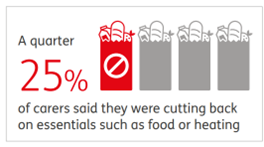Providing support at work for carers
Carers Week (5-11th June) is a campaign that ‘recognises and supports carers in the community’. It focuses on the important and vital role of over 5.7 million unpaid carers in the UK and the huge contribution they make to families and communities. Individuals and organisations come together to provide support for carers, run activities and draw attention to how important caring is.
Caring is an important part of life; it holds families together and it will affect most of us at some point in our lives. Every day 600 people become carers due to demographic changes and an ageing population, not knowing where to get help which can be frightening and isolating (Juggling Work and Care – a growing issue” 2019, Carers UK.)
The Carer’s Leave Bill is one step closer to becoming law
On 24th May, the Carer’s Leave Bill received royal assent in parliament meaning it is edging its way closer to becoming law. The manifesto aims to help support unpaid carers to remain in work and their return to work. Employers for Carers evidenced that Carer’s Leave supported retention and recruitment and with the advancement of carer-related policies it is expected to save UK Companies up to £4.8 billion a year in unplanned absences and £3.4 billion in improving employee retention by adopting flexible working practice.
In November 2022, 41% of carers were in employment. Of those, 21% work full time, 16% part-time and 4% are self-employed (Carer’s UK State of Caring Report). Many carers who were employed said they had had to cut back on their working hours to fulfil their caring responsibilities and were struggling to manage on a reduced income.
“I am self-employed, and my caring role has impacted my income as I am not able to work many hours now. My bills only get paid from savings.”
“I have had to reduce my working hours significantly to care for my daughter and it is likely my fixed term contract won’t be renewed… I am struggling to find any new work so my finances will be further impacted.”
“I do not qualify for carers allowance as I am in full-time employment. However, I spend every evening and all my weekends caring for my mother with no financial help from any organisation.”
Carers struggle to juggle paid work and caring responsibilities
Millions are juggling unpaid caring responsibilities with paid employment. Carers are saying they are tired, stressed and struggle with their own physical and mental health, cutting back on luxuries, hobbies or leisure activities and using savings on essentials such as food and heating.
Carers UK poll highlighted the following:
- 5 million people combine paid work with caring
- Over 2.6 million people have given up work at some point to care
- 2 million people have reduced hours to care.
Carers UK continues to advocate for better support in the workplace. With the support of Wendy Chamberlain MP, Carer’s Leave (for up to one week unpaid each year) should be introduced; however, this is just the start on raising public awareness. Future proposals are reviewing the Equality Act and introducing caring as the tenth protected characteristic to improve visibility and equality of carers in the society. The ultimate goal is to introduce at least 5-10 days paid leave from work, creating tailored support for carers looking to return to work and increased health and wellbeing support at work.
While increasing numbers of organisations are recognising the importance of supporting carers in the workplace, it is essential that employers maintain flexibility as they welcome employees back to the office, so that people can juggle work and care. Creating care-related policies or being more forward-thinking and introducing paid Carer’s Leave is one way to stay ahead with recruitment and retention.
What can organisations do to support Carers Week?
- Include information and advice for carers in your email newsletter
- Run an online advice or drop-in session to connect with other carers to support or offer wellbeing tips
- Hold a competition to share short stories, poems or photos about their caring experiences and provide a ceremony to celebrate the entries
- Partner with a local business to send hampers or care packages to carers
- Let staff know about carer-friendly policies and support available or launch a new policy
- Host an online quiz or coffee morning for carers to connect with other carers and take a break
- Invite a guest speaker or mental health expert to share their story
- Host an online physical activity they can do from home to boost inclusivity and wellbeing
If you would like to introduce a Carer’s Leave Policy, we can help. Please contact us to find out more and to speak to one of our consultants.





